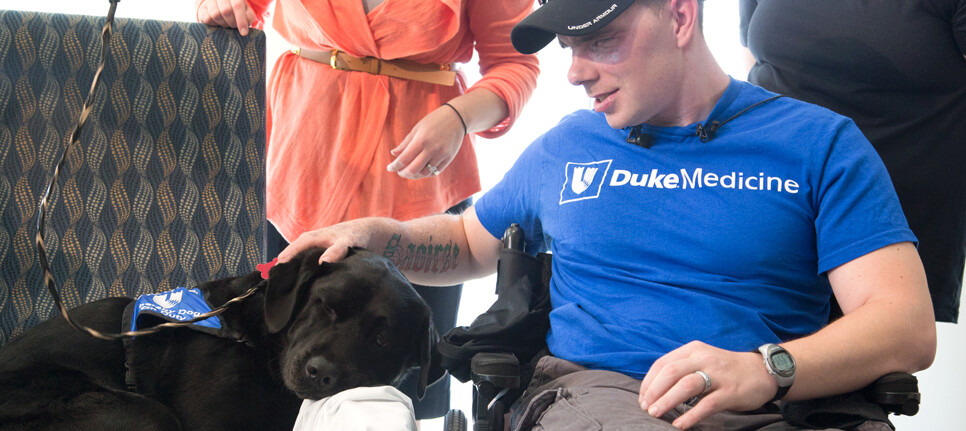After an explosion at Ft. Bragg left Sgt. Cory Muzzy with severe injuries, the soldier returned to Duke to thank his doctors for saving his life, and the therapy dog, Kylie, for helping him through the early days of his recovery.
An explosion at Ft. Bragg on Feb. 21, 2014, left Sgt. Cory Muzzy with head and spine injuries, a severed right leg and severe wounds to his left leg. Barely alive, he faced grim odds.
But on the worst day of his life, Sgt. Cory Muzzy had the fortune to be transported to Duke University Hospital, where a team of neurosurgeons, orthopedic surgeons, trauma specialists and others awaited him.
For hours, the team worked to save Sergeant Muzzy. When the soldier awoke the next day, he thought he was in a bad dream, but the heart-wrenching turn of events was real: he had lost a leg, and likely his eyesight.
Over the next weeks and months as Muzzy began to recover, he found strength in his family, his loved ones and friends, and the care team at Duke that mended his broken body.
“I wouldn’t be alive if not for Duke,” Muzzy told reporters Friday, Sept. 19, as he and his wife, Michelle, and 4 year-old son, Killean, gathered for an emotional reunion with the doctors, nurses, therapists and others who helped him regain his energy.
“It was so rewarding to see the warrior return,” said Dr. Mark Shapiro, the trauma and critical care surgeon who led the team tending Muzzy.
Now stationed in Texas, Muzzy had his right leg amputated after leaving Duke, but has been fitted with prosthetic legs and has set an ambitious goal.
“On the one-year anniversary of the accident, I want to run a 5k,” he said.
And beyond that, he hopes to work with therapy dogs like Kylie, the black Labrador retriever that he grew so fond of while he was at Duke. As he stroked Kylie’s head on Friday, Muzzy said visits from the specially trained dogs in the Pets at Duke program were another key to his recovery.
“Dogs can look into your soul,” he said, tearing up.





